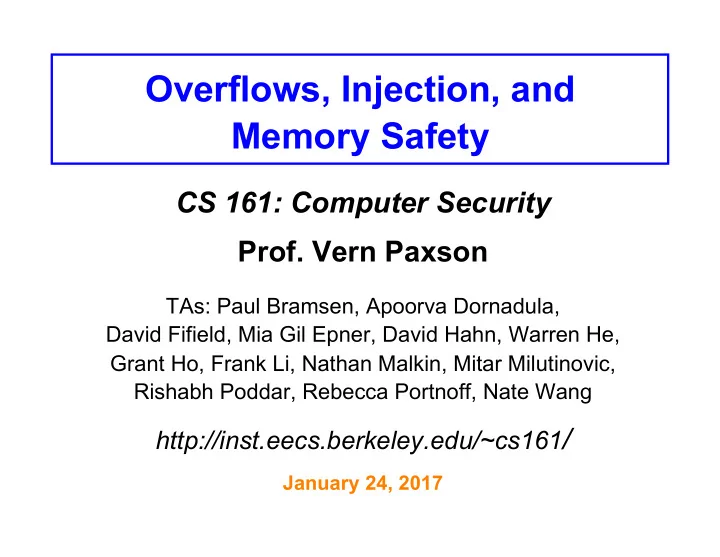

Overflows, Injection, and Memory Safety CS 161: Computer Security Prof. Vern Paxson TAs: Paul Bramsen, Apoorva Dornadula, David Fifield, Mia Gil Epner, David Hahn, Warren He, Grant Ho, Frank Li, Nathan Malkin, Mitar Milutinovic, Rishabh Poddar, Rebecca Portnoff, Nate Wang http://inst.eecs.berkeley.edu/~cs161 / January 24, 2017
Common Assumptions When Discussing Attacks • (Note, these tend to be pessimistic … but prudent) • Attackers can interact with our systems without particular notice – Probing (poking at systems) may go unnoticed … – … even if highly repetitive, leading to crashes, and easy to detect • It’s easy for attackers to know general information about their targets – OS types, software versions, usernames, server ports, IP addresses, usual patterns of activity, administrative procedures
Common Assumptions, con’t • Attackers can obtain access to a copy of a given system to measure and/or determine how it works • Attackers can make energetic use of automation – They can often find clever ways to automate • Attackers can pull off complicated coordination across a bunch of different elements/systems • Attackers can bring large resources to bear if req’d – Computation, network capacity – But they are not super-powerful (e.g., control entire ISPs)
Common Assumptions, con’t • If it helps the attacker in some way, assume they can obtain privileges – But if the privilege gives everything away (attack becomes trivial), then we care about unprivileged attacks • The ability to robustly detect that an attack has occurred does not replace desirability of preventing • Infrastructure machines/systems are well protected (hard to directly take over) – So a vulnerability that requires infrastructure compromise is less worrisome than same vulnerability that doesn’t
Common Assumptions, con’t • Network routing is hard to alter … other than with physical access near clients (e.g., “ coffeeshop ” ) – Such access helps fool clients to send to wrong place – Can enable Man-in-the-Middle (MITM) attacks • We worry about attackers who are lucky – Since often automation/repetition can help “ make luck ” • Just because a system does not have apparent value, it may still be a target • Any others?
Thinking about overflows
#293 HRE-THR 850 1930 ALICE SMITH COACH SPECIAL INSTRUX: NONE
#293 HRE-THR 850 1930 ALICE SMITHHHHHHHHHHH HHACH SPECIAL INSTRUX: NONE How could Alice exploit this? Find a partner and talk it through.
#293 HRE-THR 850 1930 ALICE SMITH FIRST SPECIAL INSTRUX: NONE
#293 HRE-THR 850 1930 ALICE SMITH FIRST SPECIAL INSTRUX: GIVE PAX EXTRA CHAMPAGNE. Passenger last name: “ Smith First Special Instrux: Give Pax Extra Champagne .”
char name[20]; void vulnerable() { ... gets(name); ... }
char name[20]; char instrux[80] = "none"; void vulnerable() { ... gets(name); ... }
char name[20]; int seatinfirstclass = 0; void vulnerable() { ... gets(name); ... }
char name[20]; int authenticated = 0; void vulnerable() { ... gets(name); ... }
char line[512]; char command[] = "/usr/bin/finger"; void main() { ... gets(line); ... execv(command, ...); }
char name[20]; int (*fnptr)(); void vulnerable() { ... gets(name); ... }
Walking Through Overflow Vulnerabili5es (See separate slides)
void vulnerable() { char buf[64]; ... gets(buf); ... }
void still_vulnerable?() { char *buf = malloc(64); ... gets(buf); ... }
void safe() { char buf[64]; ... fgets(buf, 64, stdin); ... }
void safer() { char buf[64]; ... fgets(buf, sizeof buf, stdin); ... }
Assume these are both under the control of an attacker. void vulnerable(int len, char *data) { char buf[64]; if (len > 64) return; memcpy(buf, data, len); } memcpy(void *s1, const void *s2, size_t n);
void safe(size_t len, char *data) { char buf[64]; if (len > 64) return; memcpy(buf, data, len); }
void f(size_t len, char *data) { char *buf = malloc(len+2); if (buf == NULL) return; memcpy(buf, data, len); buf[len] = '\n'; buf[len+1] = '\0'; } Is it safe? Talk to your partner. Vulnerable! If len = 0xffffffff , allocates only 1 byte
void vulnerable() { char buf[64]; if (fgets(buf, 64, stdin) == NULL) return; printf(buf); }
printf("you scored %d\n", score);
sfp printf(“you scored %d\n”, score); score 0x8048464 rip sfp printf() \0 \n d d e % o c r s u y 0x8048464 o
printf("a %s costs $%d\n", item, price);
sfp printf("a %s costs $%d\n", item, price); price item 0x8048464 rip sfp printf() d % \0 \n s t $ s o c % a 0x8048464 s
Fun With printf Format Strings … Format argument is missing! printf("100% dude!");
sfp printf(“100% dude!”); ??? 0x8048464 rip sfp printf() \0 ! e d u d % 0 0 1 0x8048464
Fun With printf Format Strings … printf("100% dude!"); ⇒ prints value 4 bytes above retaddr as integer printf("100% sir!"); ⇒ prints bytes pointed to by that stack entry up through first NUL printf("%d %d %d %d ..."); ⇒ prints series of stack entries as integers printf("%d %s"); ⇒ prints value 4 bytes above retaddr plus bytes pointed to by preceding stack entry printf("100% nuke ’ m!"); What does the %n format do??
%n writes the number of characters printed so far into the corresponding format argument. int report_cost(int item_num, int price) { int colon_offset; printf("item %d:%n $%d\n", item_num, &colon_offset, price); return colon_offset; } report_cost(3, 22) prints "item 3: $22" and returns the value 7 report_cost(987, 5) prints "item 987: $5" and returns the value 9
Fun With printf Format Strings … printf("100% dude!"); ⇒ prints value 4 bytes above retaddr as integer printf("100% sir!"); ⇒ prints bytes pointed to by that stack entry up through first NUL printf("%d %d %d %d ..."); ⇒ prints series of stack entries as integers printf("%d %s"); ⇒ prints value 4 bytes above retaddr plus bytes pointed to by preceding stack entry printf("100% nuke ’ m!"); ⇒ writes the value 3 to the address pointed to by stack entry
void safe() { char buf[64]; if (fgets(buf, 64, stdin) == NULL) return; printf("%s", buf); }
Recommend
More recommend